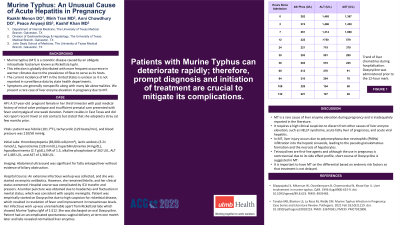Tuesday Poster Session
Category: Liver
P4007 - Murine Typhus: An Unusual Cause of Acute Hepatitis in Pregnancy
Tuesday, October 24, 2023
10:30 AM - 4:00 PM PT
Location: Exhibit Hall

Has Audio
- RM
Raakhi Menon, DO
University of Texas Medical Branch
Galveston, TX
Presenting Author(s)
Raakhi Menon, DO, Minh Tran, MD, Anni Chowdhury, DO, Peace Anyaeji, , Kashif Khan, MD
University of Texas Medical Branch, Galveston, TX
Introduction: Murine typhus (MT) is a zoonotic disease caused by an obligate intracellular bacterium known as Rickettsia typhi. Symptoms are generally nonspecific, with many lab abnormalities. We present a rare case of severe acute hepatitis in pregnancy due to MT.
Case Description/Methods: A 37-year-old female in her third trimester with history of insufficient prenatal care presented with fever and myalgia of one week duration. Of note, the patient resides in East Texas and recently adopted a stray cat. On admission, patient was febrile (101.7°F), tachycardic (129 beats/min), with blood pressure of 110/58 mmHg. Initial labs showed thrombocytopenia (83,000 cells/mm3), lactic acidosis (3.21 mmol/L), hyponatremia (128 mml/L), hyperbilirubinemia (4 mg/dL), hypoalbuminemia (2.7 g/dL), INR of 1.5, alkaline phosphatase of 262 U/L, ALT of 1,485 U/L, and AST of 1,368 U/L. Abdominal ultrasound was significant for fatty enlarged liver without evidence of biliary obstruction. An extensive infectious workup was collected, and the patient was started on empiric antibiotics. The workup, including blood cultures, viral hepatitis serology, ceruloplasmin, Tylenol level, and autoimmune studies, was unremarkable. Hospital course was quickly complicated by transfer to the intensive care unit requiring pressors. A lumbar puncture was obtained due to headaches and fluctuations in mental status, which was consistent with aseptic meningitis. Patient was empirically started on Doxycycline due to high suspicion for rickettsial disease, which resulted in resolution of fever and improvement in transaminase levels. Rickettsial labs showed Murine Typhus IgM of 1:512. Patient was discharged with oral Doxycycline but was lost to follow-up for repeat Typhus IgG levels to confirm diagnosis with seroconversion. Patient had an uncomplicated spontaneous vaginal delivery at term one month later, and labs revealed normalized liver enzymes.
Discussion: MT is a rare cause of liver enzyme elevation during pregnancy and is inadequately reported in the literature. It requires high clinical suspicion to discern from other causes of liver enzyme elevation, such as HELLP syndrome, acute fatty liver of pregnancy, and acute viral hepatitis. In MT, liver injury occurs due to polymorphonuclear neutrophils (PMNs) infiltration into the hepatic sinusoids, leading to the pseudo granulomatous formation and necrosis of hepatocytes. Patients can deteriorate rapidly; thus, prompt diagnosis based on endemic risk factors and initiation of treatment are crucial.

Disclosures:
Raakhi Menon, DO, Minh Tran, MD, Anni Chowdhury, DO, Peace Anyaeji, , Kashif Khan, MD. P4007 - Murine Typhus: An Unusual Cause of Acute Hepatitis in Pregnancy, ACG 2023 Annual Scientific Meeting Abstracts. Vancouver, BC, Canada: American College of Gastroenterology.
University of Texas Medical Branch, Galveston, TX
Introduction: Murine typhus (MT) is a zoonotic disease caused by an obligate intracellular bacterium known as Rickettsia typhi. Symptoms are generally nonspecific, with many lab abnormalities. We present a rare case of severe acute hepatitis in pregnancy due to MT.
Case Description/Methods: A 37-year-old female in her third trimester with history of insufficient prenatal care presented with fever and myalgia of one week duration. Of note, the patient resides in East Texas and recently adopted a stray cat. On admission, patient was febrile (101.7°F), tachycardic (129 beats/min), with blood pressure of 110/58 mmHg. Initial labs showed thrombocytopenia (83,000 cells/mm3), lactic acidosis (3.21 mmol/L), hyponatremia (128 mml/L), hyperbilirubinemia (4 mg/dL), hypoalbuminemia (2.7 g/dL), INR of 1.5, alkaline phosphatase of 262 U/L, ALT of 1,485 U/L, and AST of 1,368 U/L. Abdominal ultrasound was significant for fatty enlarged liver without evidence of biliary obstruction. An extensive infectious workup was collected, and the patient was started on empiric antibiotics. The workup, including blood cultures, viral hepatitis serology, ceruloplasmin, Tylenol level, and autoimmune studies, was unremarkable. Hospital course was quickly complicated by transfer to the intensive care unit requiring pressors. A lumbar puncture was obtained due to headaches and fluctuations in mental status, which was consistent with aseptic meningitis. Patient was empirically started on Doxycycline due to high suspicion for rickettsial disease, which resulted in resolution of fever and improvement in transaminase levels. Rickettsial labs showed Murine Typhus IgM of 1:512. Patient was discharged with oral Doxycycline but was lost to follow-up for repeat Typhus IgG levels to confirm diagnosis with seroconversion. Patient had an uncomplicated spontaneous vaginal delivery at term one month later, and labs revealed normalized liver enzymes.
Discussion: MT is a rare cause of liver enzyme elevation during pregnancy and is inadequately reported in the literature. It requires high clinical suspicion to discern from other causes of liver enzyme elevation, such as HELLP syndrome, acute fatty liver of pregnancy, and acute viral hepatitis. In MT, liver injury occurs due to polymorphonuclear neutrophils (PMNs) infiltration into the hepatic sinusoids, leading to the pseudo granulomatous formation and necrosis of hepatocytes. Patients can deteriorate rapidly; thus, prompt diagnosis based on endemic risk factors and initiation of treatment are crucial.

Figure: A steep decline in both AST and ALT can be appreciated after the administration of Doxycycline between hospital day one and two.
Disclosures:
Raakhi Menon indicated no relevant financial relationships.
Minh Tran indicated no relevant financial relationships.
Anni Chowdhury indicated no relevant financial relationships.
Peace Anyaeji indicated no relevant financial relationships.
Kashif Khan indicated no relevant financial relationships.
Raakhi Menon, DO, Minh Tran, MD, Anni Chowdhury, DO, Peace Anyaeji, , Kashif Khan, MD. P4007 - Murine Typhus: An Unusual Cause of Acute Hepatitis in Pregnancy, ACG 2023 Annual Scientific Meeting Abstracts. Vancouver, BC, Canada: American College of Gastroenterology.
